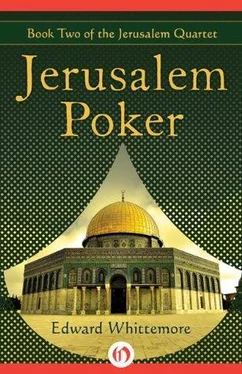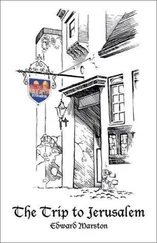Is he real? whispered a bewildered Iraqi prince.
That he is, said Joe, studying his cards.
But who is he?
Joe looked up.
Well I guess he could be fate, couldn't he? I mean that would be consistent with a game of chance. Fate keeping watch and all.
Is that what he's doing up there? Keeping watch?
Who's to say? Maybe he's surveying the centuries for some forgotten event that ought to be remembered. Now whose bet is it, gents? Let's get on with the bets.
But what does he see up there? Ask him what he sees.
And why not. Haj Harun? Hello up there, what do you see?
How's that, Prester John?
I was just wondering what might be up there on the rainy horizon today. How's the view?
Haj Harun turned to peer into the crumbling plaster of the corner, two feet from his face. He nodded.
I don't like to say it, but the Medes may be coming.
Are you sure? That rabble again?
They may be.
Bad in the rain, very bad, how are the city walls holding up? Safe and strong as they should be? No gates left open? Better check around so we can breathe easy.
I will, Prester John.
Haj Harun looked back at the wall in the corner. He squinted and his helmet went awry, releasing a shower of rust in his eyes. The tears began to flow.
Why does he keep calling you Prester John? asked a Syrian jewel thief.
Because the first time I walked in here I was wearing a Victoria Cross around my neck, being then in retirement and living in the Home for Crimean War Heroes, and because of that he mistook me for the legendary lost Christian monarch of a vast kingdom somewhere in Asia.
Where in Asia?
I don't know and he doesn't know either. I suppose you could ask the scarab, the scarab's likely to know but I doubt that he's talking today. Generally he sleeps away the winter. Anyway, since I was lost he naturally assumed I'd come to Jerusalem to find myself again. Now whose bet is it, I say?
The Syrian jewel thief giggled.
You're both mad. He's just staring at the wall up there.
Not a bit of it, said Joe. That's not a wall he's looking into, it's a mirror. The mirror of the mind, it's called.
Believe me it's true.
The Syrian went on giggling.
Well who does he think that is? he asked, pointing across the table at Munk.
He doesn't think, said Joe, he knows. Just watch. Hello up there, Haj Harun, or Aaron as the Jews and Christians call you. Who's this article down here who's being pointed at?
The wizened old man wiped the tears from his eyes and peered down at the table.
That's Bar Cocheba, he said.
Hey Munk, seems he spotted you right off, whispered Joe. Seems he nailed you right down in the course of history. Was he right now? What moment in history would it be for this gent called Bar Cocheba?
First half of the second century, answered Munk, studying his cards.
Role? asked Joe.
Defender of the Jewish faith, said Munk.
Future?
Death in combat. Dying in revolt against the invincible Roman legions.
Is that so? Joe called up. Are the Roman legions really invincible? What do you see up there?
Haj Harun turned back to the wall. He smiled.
Only for a time, Prester John. After a time they lose.
There. You see, Munk, you see how it is? The Romans turn out to be vincible after all. Time it takes, naturally. Time as it was or will be. Time is all.
Time is, murmured Haj Harun dreamily from his perch on top of the safe.
See anything more? Joe called out.
For Bar Cocheba, yes. I predict this game of chance will be very profitable for him. After all, there are nineteen years in a lunar cycle.
Joe looked confused.
According to the Jewish calendar, whispered Munk.
And thus, continued Haj Harun, since you began this game in the Jewish year of 5682, Bar Cocheba should do very well indeed.
Joe looked even more confused.
And why might that be?
Because that year was the first year of the three-hundredth lunar cycle, answered Haj Harun. And that certainly sounds auspicious to me, given the fact there were three of you who founded the game.
Joe whistled softly.
Facts, gents, they're just dropping all over the place. And is that a proper lunar evaluation from the top of the safe or not? Fate on target again as usual, there's nothing like it. But hold on now. I think I can hear a less distant moment in time preparing to announce itself.
The chimes attached to the sundial in the front room creaked and began to strike at four o'clock on that rainy afternoon. In all they chimed twelve times.
Midnight, said Joe. I think we better be adjourning in about an hour. Is the time limit agreed?
That's a good idea, said Munk. I'm rather tired tonight.
So am I, added Cairo, suppressing a yawn.
The other players, who had been heavy losers in the three hours since the session began, were on their feet protesting. A wealthy French merchant from Beirut was particularly angry.
Fraud, he shrieked, shaking his fists. How do you know it's midnight? It could just as well be twelve o'clock noon.
Could be but it isn't, said Joe, smiling. The chimes struck off noon an hour before you arrived. What time did you think you got here?
I know when I got here, shrieked the Frenchman. It was at one o'clock.
Well there you are. The chimes have to be striking midnight, couldn't be anything else. Bets now anyone?
We've still got a good hour of fast playing ahead before closing time. Munk, isn't the bet to you?
I believe it is. And since Haj Harun has found lunar evidence for my success in this game, I'm going to take advantage of it by tripling this wager our princely guest from Baghdad had just ventured. Gentlemen, the stakes rise in the cause of lunacy.
Fine, said Joe, very fine. We're off again. No reason to hold back just because there are only three hours between noon and midnight on a rainy day in February. That happens all the time in bad weather. But spring will be coming soon and then we can make up for it.
— 6-
St Catherine's Monastery
Choice is the arrow.
Early in 1913, Munk arrived back in the Middle East and traveled widely on his mission for the Sarahs.
Before the end of the year he was able to report to them that although there was evidence someone might have owned the Ottoman Empire once, it was equally obvious no one owned it now, least of all the Ottomans.
The old jade is tottering to her grave, he wrote in a letter to Budapest. Once stately, now exhausted, she laments in the twilight, abused and humiliated on every side. Soon night must take her.
Munk sensed he was also describing the approaching collapse of the Austro-Hungarian Empire, although he couldn't possibly have guessed how quickly that would happen. Yet in the next few years not only did the Empire of the Sarahs disappear but with it the once powerful House of Szondi, both swept away in the First World War.
Young Munk watched it all from afar, no longer interested in soldiering yet still searching as always for a role in life and pondering the question that had been with him since childhood, the mysterious force that had driven his great-grandfather, Johann Luigi, a century ago.
Munk traveled alone during the war years, trading throughout the Middle East and sharing his confidences with only one man, an unlikely friend yet also his closest during that period, a wealthy old Greek satyr who lived in Smyrna.
Unlikely on the surface of it, for Sivi was then a man already in his sixties, nearly forty years older than Munk. But he seemed to have known everyone in his time, having long been intimate with every manner of Levantine intrigue, and despite his notorious sexual excesses he was a wise and gentle friend, who adopted Munk as easily as if that had been his purpose in life.
Читать дальше












